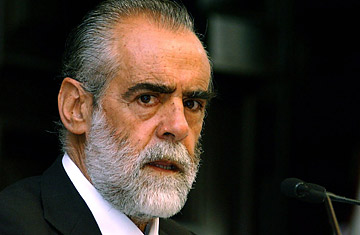
Former Mexican presidential candidate Diego Fernández de Cevallos was kidnapped near his ranch in Pedro Escobedo, Mexico
The white SUV was found on an unpaved country road with bloodstains on the seats. Within hours, hundreds of soldiers and police poured across ranches and fields looking for possible clues to the whereabouts of former Mexican presidential candidate Diego Fernández de Cevallos, who disappeared last Friday. As the search got under way, frantic politicians and media reported that the victim's body had been found, then said that he was in hospital with a bullet wound and then that he was still missing.
Even in a nation numbed by escalating drug-related mayhem, the abduction and feared murder of the leading conservative politician sent shock waves through the political establishment. Fernández, a 69-year-old lawyer with penetrating eyes and a trademark white beard, has been one of the most colorful, controversial and influential figures in Mexican politics. A member of President Felipe Calderón's National Action Party, or PAN, Fernández was the undisputed winner of Mexico's first-ever election debate in 1994, though he later lost the election. The latest incident reminds Mexico's rich and powerful that they are not immune to the crime wave piling up bodies on the streets. And it adds fuel to the simmering political dispute over how to bring order to the country.
The investigation into Fernández's disappearance sparked a confusion familiar in many recent high-profile murders and kidnappings in Mexico. Fernández was last seen driving from his home in the Mexican capital to a ranch he owns three hours away in the state of Querétaro. At 7 a.m. on Saturday, family members found Fernández's abandoned car near the ranch and launched a manhunt. Confusing and contradictory information then sped across the airwaves. Party comrade Manuel Espino tweeted that Fernández's body had been found on a nearby military base, then said the information was unconfirmed and sent an apology to media outlets. A leading radio presenter announced that family members were going to see Fernández in a nearby hospital. Mexican news websites flashed reports that a decapitated body had been found nearby. The Federal Attorney General's office sent three different news releases saying the bearded politician was nowhere to be seen. "Until now there is no sign that Fernández is not still missing," it said in the last statement. Amid the confusion, President Calderón sat waiting in his presidential jet before eventually departing late on a scheduled trip to Spain.
There was no shortage of potential suspects and motives for Fernández's abduction. Gangs have targeted other wealthy ranchers in the area for kidnappings for ransom. Two of Mexico's most violent drug cartels — the Zetas and La Familia — are also active in Querétaro. Fernández's law firm has represented many controversial and shady characters and businesses over the years, including a hospital that carried out plastic surgery on drug traffickers. Hard leftists despised Fernández, and a leftist guerrilla group is alleged to have been behind the kidnapping of Mexican billionaire Alfredo Harp Helu in 1994.
Tension has also been simmering inside the PAN in the run-up to 12 governorship races this year, with Fernández backing a faction opposed to Calderón. Meanwhile, there has also been a wave of attacks on political candidates across Mexico. On Thursday, assassins killed the mayoral candidate of Calderón's party in Valle Hermoso, a small city about 25 miles south of the Rio Grande at Brownsville and an area of intense drug-related bloodshed. A week earlier, assailants torched the home of a woman seeking the nomination of the leftist Democratic Revolutionary Party for mayor of nearby Nuevo Laredo.
Fernández had been a key figure in the PAN's rise to power that ended 71 years of rule by the Institutional Revolutionary Party, or PRI, with the election of Vicente Fox as President in 2000. In the 1994 election, Fernández provided an unusually earthy, candid, cigar-chomping alternative to Mexico's usual menu of two-dimensional politicians. He broke completely with the stiff playbook of the nation's presidential candidates, showing up at soccer games at Azteca Stadium in blue jeans and cowboy boots, waving a big stogie. He'd point the cigar at the stadium's presidential box and then buy beers for fans. He scored big in front of more than 30 million viewing Mexico's first-ever presidential debate that year, skewering his Yale-educated opponent Ernesto Zedillo with lines like, "You're a good boy who got good grades, but your plan has left 40 million people in poverty." At the same time, he made it clear to voters that the free-market reforms like NAFTA that PRI leaders were pushing at that time had been the PAN's platform all along. "The PAN was promoting these issues before Zedillo was born," he said in an interview.
Never shy of controversy, he was known for making racist and sexist slurs, and he proudly defended his machismo when papers drew attention to the fact that that he'd fathered a son out of wedlock. Party comrades also criticized him for having an authoritarian bent, although his strength and determination was never challenged. "Diego means character, determination, decision, courage, confidence. He is the type that Mexico needs," fellow politician Espino told TIME. In one recent interview with a journalist from Mexico's Universal newspaper, Fernández was asked what he thought about dying. "One should not fear death. It arrives and that is it," he said. "You cease to be what you are but you go on being something more than the body."
— With reporting by Tim Padgett / Miami
